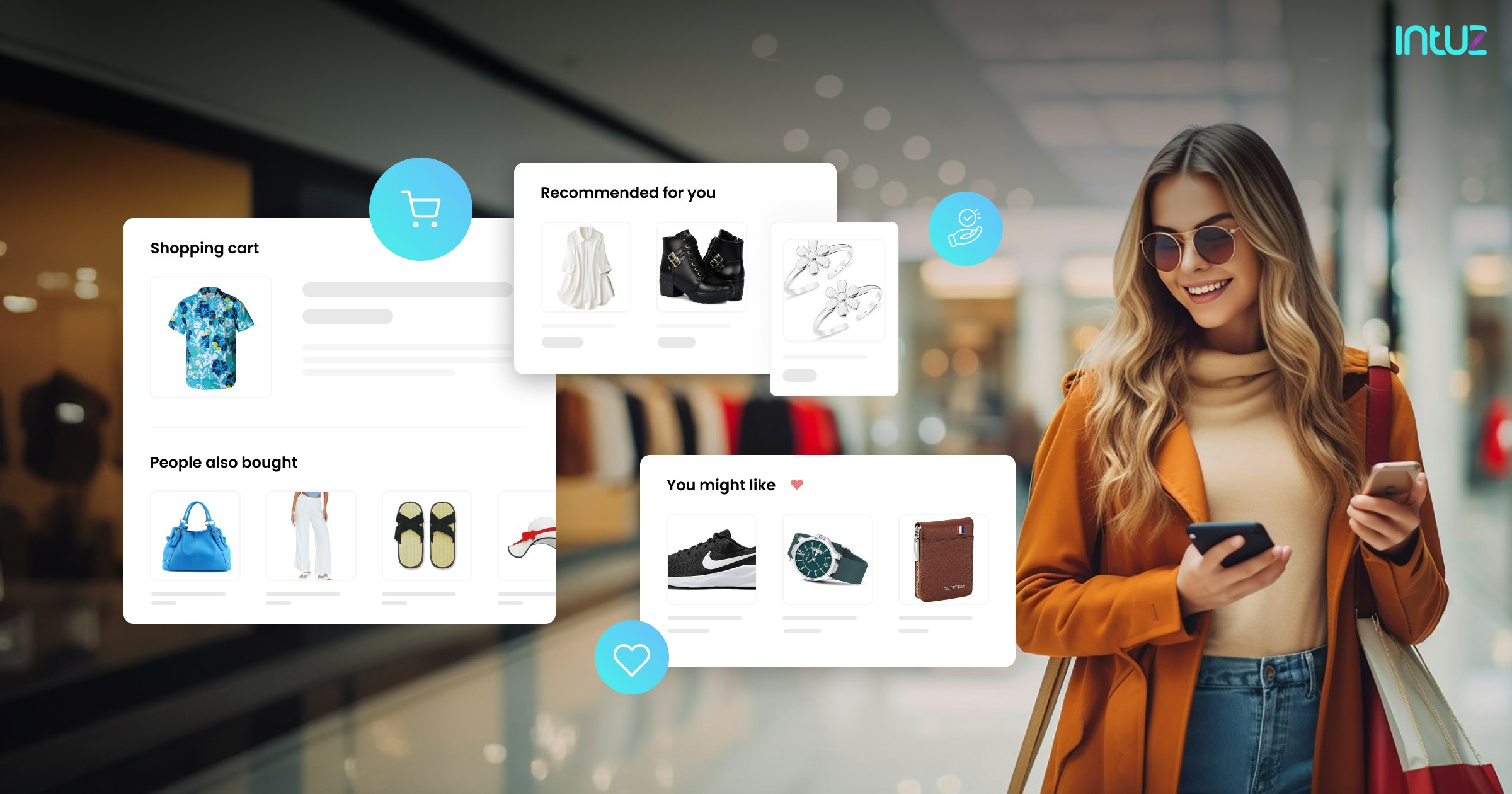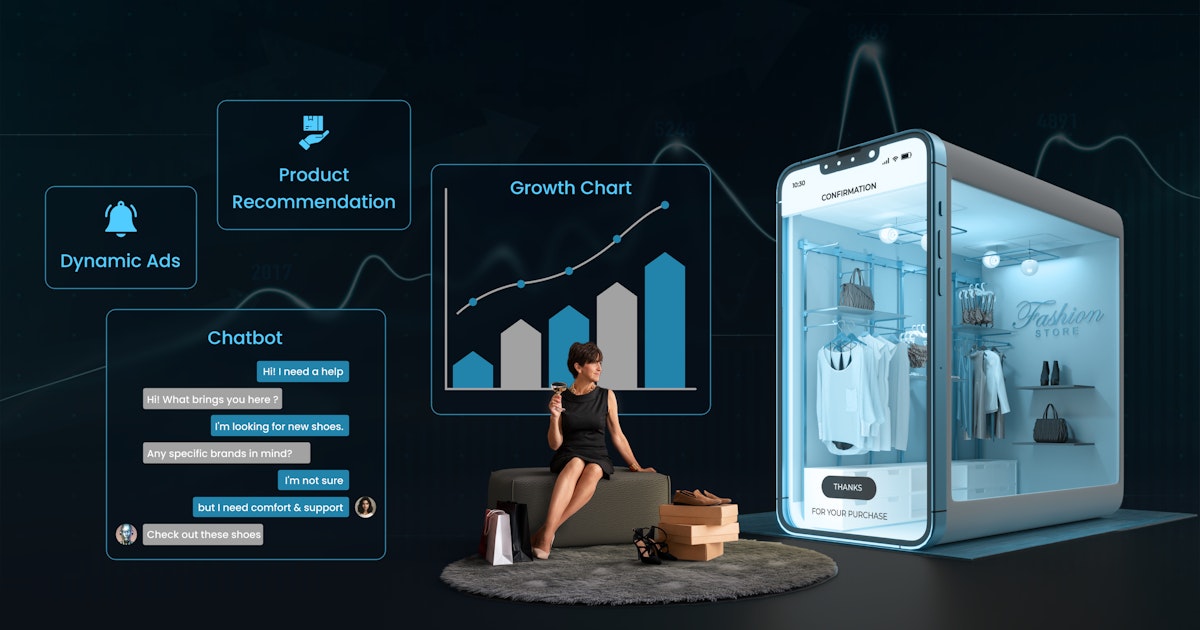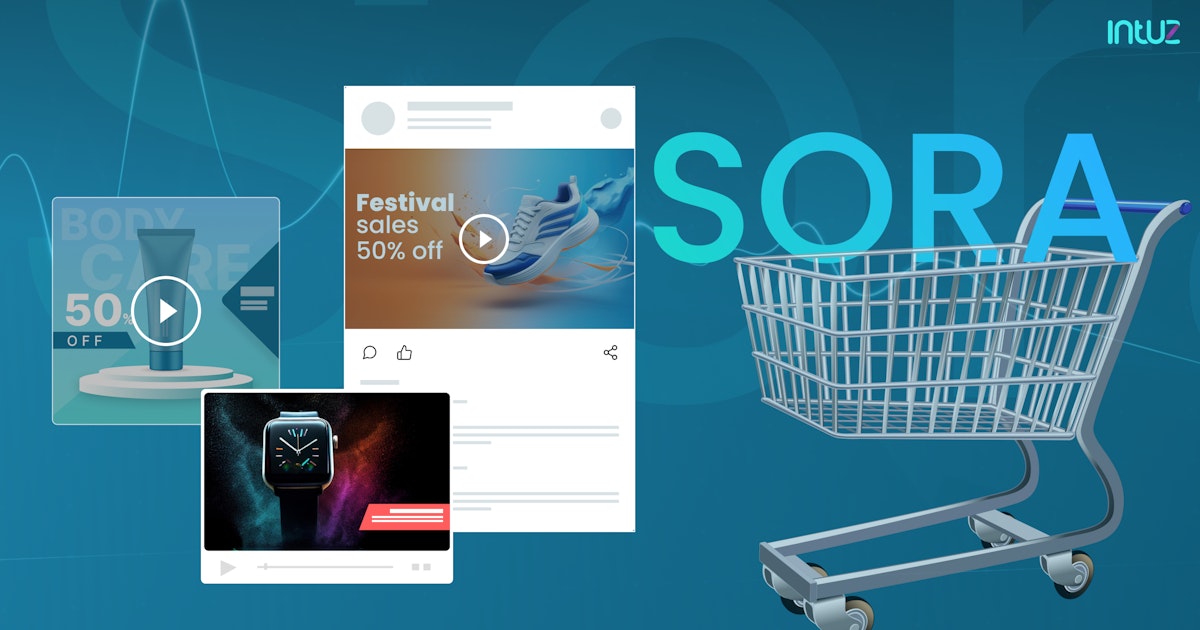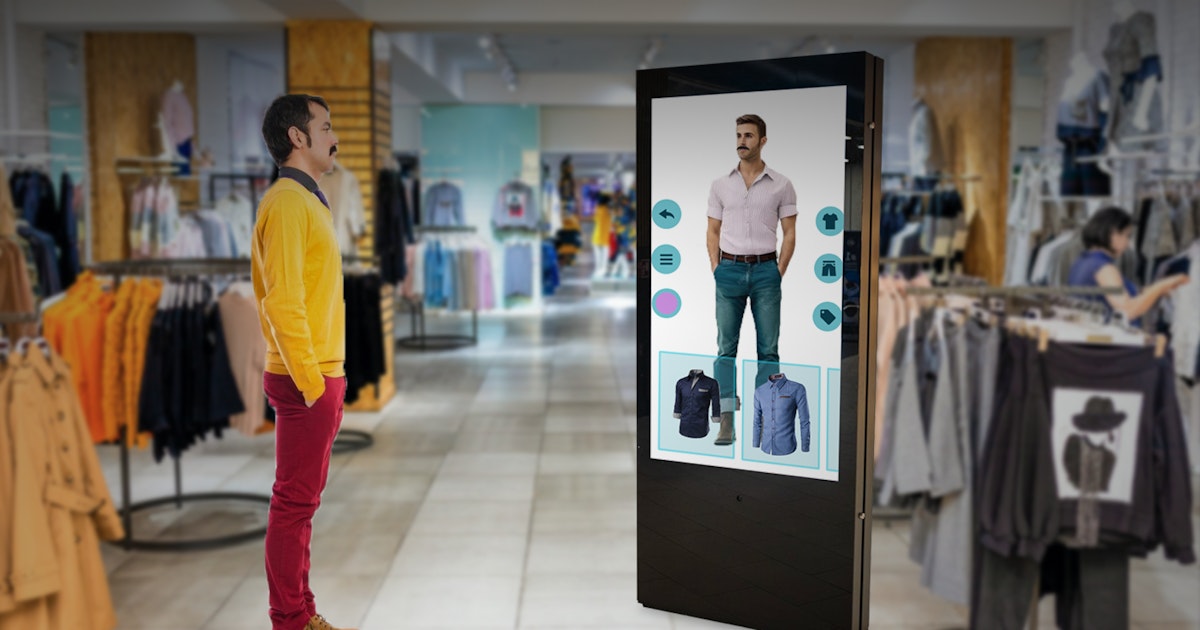Table of Content
Imagine the frustration of browsing through an online shoe store only to be shown recommendations for shoes you already own.
This annoyance is far from uncommon; according to Statista, 43% of U.S. customers report receiving marketing content for products they’ve already purchased.
With 71% of customers expecting personalized experiences in this day and age, one can’t ignore the power of making relevant product recommendations.
So who’s the culprit?
Traditional recommendation systems—these rely on past consumer behavior, including purchase history and browsing patterns, to suggest products to online shoppers. However, as discussed above, these are not always accurate.
What is AI-powered Personalized Product Recommendation?
AI-powered personalized product recommendation is a technology that uses artificial intelligence algorithms to analyze customer data — like browsing history, past purchases, and preferences — to suggest products tailored to each user’s interests. By predicting what a customer is likely to buy next, businesses can increase sales, boost customer satisfaction, and deliver a more relevant shopping experience automatically.
It makes use of deep learning models that understand nuanced customer data, such as interaction history, previous purchases, product preferences, and other contextual information, which could be in the form of the user’s current situation, environment, or user behavior.
Generative AI- the powerful tool that can identify patterns and relationships within the data that may not be immediately apparent to develop custom marketing campaigns and offers, potentially increasing both the average order value and conversion rates of the eCommerce industry. Also, explore - How to boost eCommerce sales ROI by 20% using Generative AI
Want to learn more? You’re in for a treat.
Key takeaways
AI-powered personalized product recommendation engines, often developed by a specialized AI development company, gather critical user data such as browsing history, purchase behavior, and demographic information.
AI models such as Variational Autoencoders (VAEs), Generative Adversarial Networks (GANs), and Transformer-based models are taught to understand and generate data that resembles the customer data gathered before.
Recommendation systems can apply any of three techniques to make relevant suggestions: collaborative filtering, content-based filtering, or a mix of the two.
Generative AI personalized product recommendations lead to increased average order value, higher customer retention, greater conversion rates, and reduced costs.
Amazon, Alibaba, and ByteFry currently deploy Generative AI technologies for making relevant recommendations, enabling enjoyable shopping eCommerce experiences.
How do personalized product recommendations work?
Simply put an eCommerce product recommendation engine filters and sorts your online store’s product offers using AI. But what’s the process behind it? Let’s break it down into digestible steps:
- Gather and analyze browsing history to understand which products customers have explored and what interests them.
- Examine purchase behavior to see what they’ve bought before and reveal brand loyalties and preferences.
- Collect demographic information like age, location, and gender to identify shopping patterns and likely interests.
- Compile product data including descriptions, attributes, and categories for better matching with customer profiles.
- Train AI models such as Variational Autoencoders (VAEs), Generative Adversarial Networks (GANs), and Transformer-based models on this data.
- Use VAEs to encode and decode data, GANs to generate and refine realistic suggestions, and Transformers to analyze sequential customer data.
- Generate recommendations with collaborative filtering by finding similar user behaviors and preferences.
- Enhance accuracy with content-based filtering and hybrid systems that combine both methods for the best personalized product suggestions.
AI-Powered Personalized And Scalable Florist Ecommerce Solution - Case Study
Explore Now!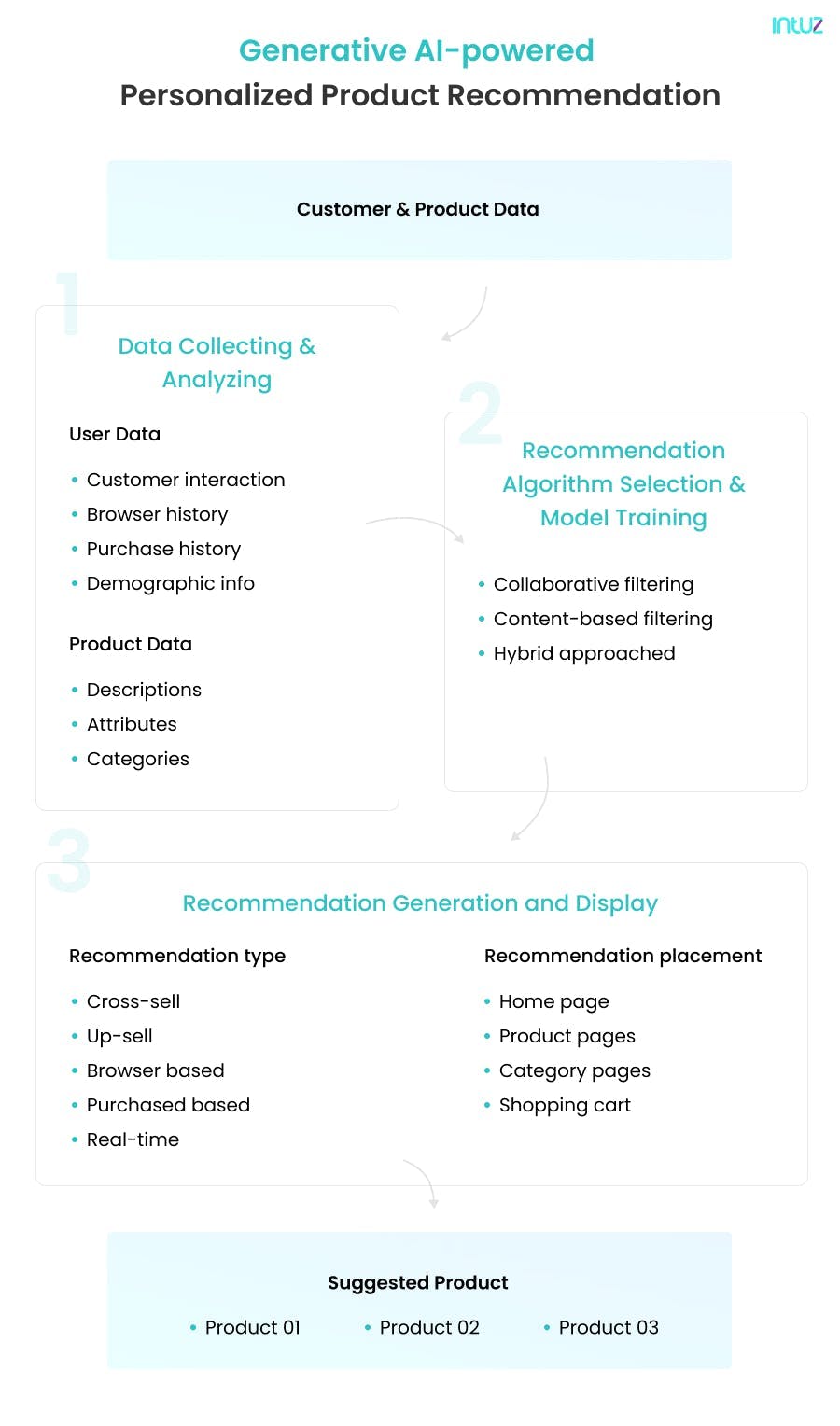
Three most common types of recommendation engine
Collaborative filtering:
This method looks at what other users with similar tastes and preferences have liked or bought and then recommends similar items to you. It’s akin to receiving recommendations from friends who know your preferences.
Content-based filtering:
This method zooms in on the characteristics or descriptions of products a customer has previously shown interest in. For example, if you frequently browse trench coats from a specific brand, the system may suggest trench coats in styles, colors, or similar materials.
Hybrid recommendation systems:
To bridge the gaps inherent in the above methods, many systems employ a mix of both collaborative and content-based filtering.
Benefits of AI-driven recommendations
Research shows that when customers receive personalized product suggestions, they spend more time on an eCommerce website and are less likely to compare prices on Amazon. You can benefit from Generative AI personalized product recommendations in four ways:
1. High conversion rates
Generative AI refines the accuracy and relevance of product recommendations, translating into higher conversions.
By analyzing a wide range of datasets, AI algorithms can predict customer preferences with remarkable precision, presenting products that customers are more inclined to buy.
For instance, in the case of an eCommerce fashion brand, the AI system could determine which customers prefer eco-friendly and sustainable fashion products.
So the next time they visit the site, they’re immediately presented with a curated selection of new arrivals and exclusive offers from environmentally conscious brands.
Businesses employing AI for personalized recommendations have seen conversion rates increase by up to 915% in some cases.
2. Increased average order value (AOV)
Delivering more targeted recommendations with this technology does more than just personalizing the online shopping experience; an AI shopping assistant can help boost the average order value (AOV), earn your customer trust, and give you a competitive edge.
AI-driven cross-selling and upselling tactics encourage customers to add more to their carts by intelligently suggesting additional items that complement or enhance what they are already interested in.
For example, someone buying a pair of jeans might want to pair them with a T-shirt and jacket to complete the look. Without smart product recommendations, they would have to navigate through various categories on the website to find these complementary items.
This customer experience is inconvenient, particularly during the checkout process, and presents a risk of abandonment if there are fewer steps involved. Therefore, AI recommendations can seamlessly optimize your marketing strategies by immediately suggesting a t-shirt and jacket to accompany the jeans once they’re added to the cart.
3. Reduced costs
Generative AI streamlines operational efficiencies, particularly by automating the product recommendation process.
The conventional method of manually curating and updating product listings for targeted marketing campaigns takes time and effort. It also requires a dedicated team to analyze sales data, customer feedback, and market trends.
The AI system dynamically updates recommendations based on real-time data analysis, freeing up the team to focus on strategic initiatives.
This reduces operational costs and improves the timeliness and relevance of product recommendations. Such a level of automation also boosts productivity growth, contributing an additional 0.5% to 3.4% annually.
4. Higher customer engagement
Personalized recommendations powered by Generative AI keep customers engaged by delivering a shopping experience tailored to individual preferences. This level of customization fosters a deeper connection between the customer and your eCommerce business.
For example, consider an online bookstore using Generative AI to analyze a customer’s purchases, browsing history, and ratings. The AI system identifies that a particular customer enjoys historical fiction, especially those set during World War II.
Based on this, the bookstore customizes its homepage for this customer, showcasing new releases, top picks, and hidden gems within the historical fiction genre, particularly those set in WWII. This approach engages customers, making them more likely to return and make additional purchases.
Brands using personalized recommendations see a 6%-10% increase in engagement compared to those that don’t.
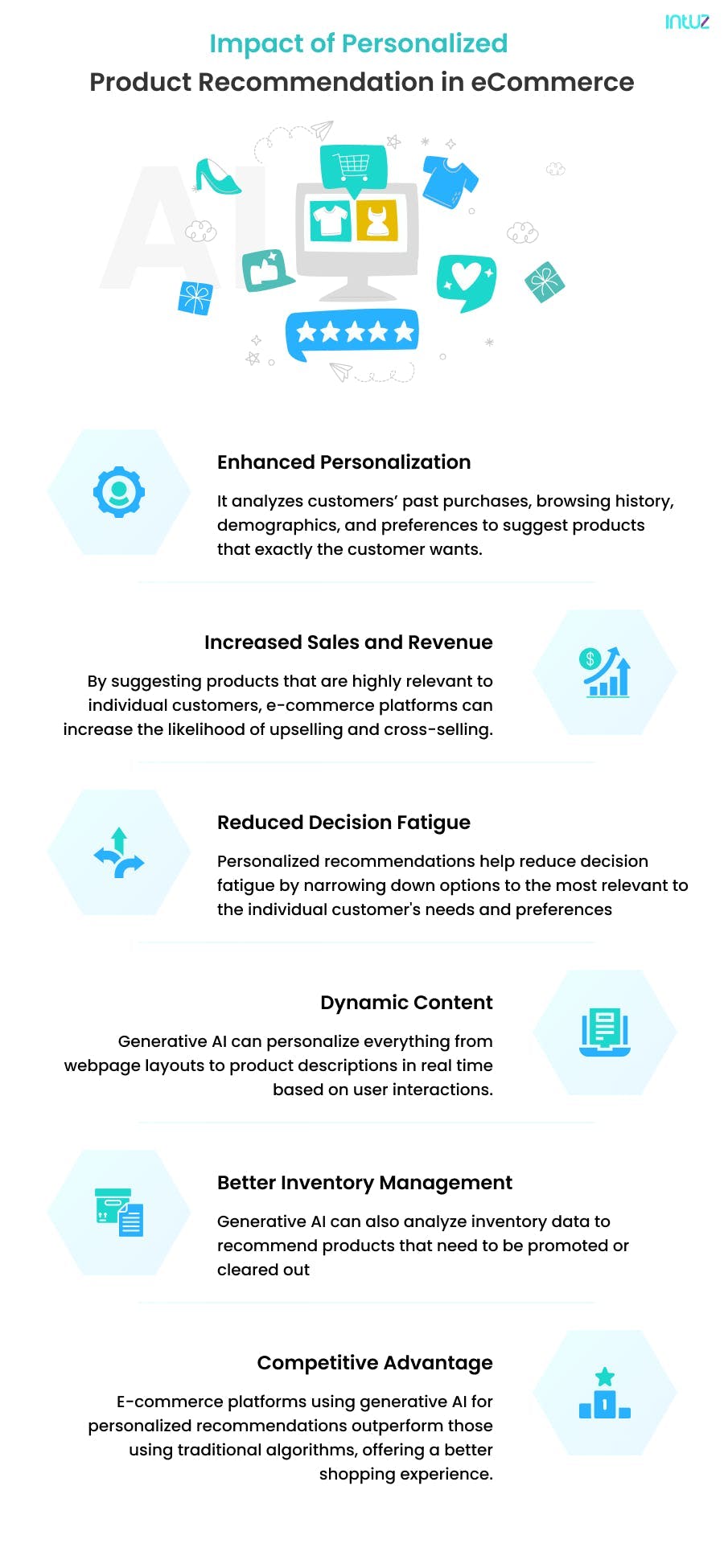
How leading eCommerce businesses are winning with Generative AI-powered personalized recommendations
1. Amazon
Amazon uses advanced Machine Learning (ML) algorithms to sift through vast amounts of customer data and deliver bespoke product suggestions through its system, Amazon Personalize.
This technology enables new popular product discovery, optimizes data for real-time personalization, and even customizes search results through integration with OpenSearch.
The AI tailors product recommendations based on browsing history, customer behavior, and preferences. McKinsey reports that 35% of consumer purchases on Amazon come from product recommendations.
2. Alibaba
This Chinese E-commerce platform maximizes revenue by optimizing the digital shopping experience with its Alibaba Cloud Artificial Intelligence Recommendation (AIRec) system.
This technology leverages big data to generate real-time, personalized product recommendations across its online shopping platforms.
For example, AIRec can be used in the “you may also like” and “related recommendations” scenarios to deploy personalized recommendations.
The system also uses Natural Language Processing (NLP) to help online merchants automatically generate product descriptions. AIRec can also quickly and accurately distribute the expected content from a pool that contains massive content, such as user-generated content (UGC).
3. ByteFry
This mid-sized online fashion retailer faced the challenge of personalizing recommendations across an extensive product catalog.
By integrating Meta’s LLAMA-2 natural language model hosted on Azure, ByteFry achieved real-time personalized recommendations, resulting in an 18% increase in average order value and a 21% reduction in cart abandonment.
This AI-driven approach allowed for dynamic pricing and custom pop-ups, resonating strongly with the targeted customer base of style-conscious 20-35-year-olds.
Generative AI Apps & Solutions Development Services Company
Explore servicesLeveraging generative AI for personalized eCommerce experiences
In the ever-evolving and highly competitive eCommerce landscape, the benefit of personalized product recommendations cannot be overstated.
With the advent of Generative AI, the capability to personalized suggestions to each customer based on their preferences, purchase history, and browsing behavior is changing how eCommerce businesses engage with their audiences.
By implementing a strategy centered around Generative AI, you can, too, enhance customer satisfaction, elevate sales figures, and positively impact your eCommerce brand’s perception in the marketplace.
If you are an eCommerce company looking to boost sales with generative AI-driven personalized product recommendations,
Book Your Free 45-minute Consultation with Our Generative AI Experts Today!
During this tailored consultation, our team will:
Conduct a complimentary analysis of your product catalog to identify AI personalization opportunities
Guide on Generative AI techniques to optimized your recommendation algorithms for boosted conversion rates
Share actionable strategies for seamlessly integrating AI-driven personalization into your existing eCommerce platform
Provide a customized roadmap for deploying Generative AI solutions
